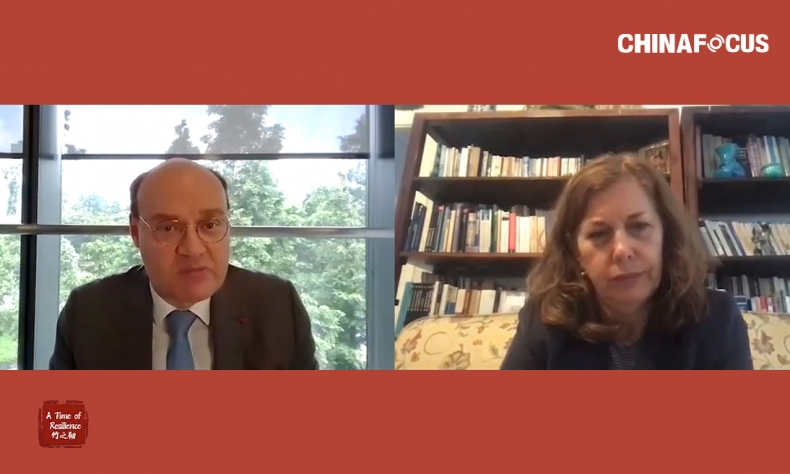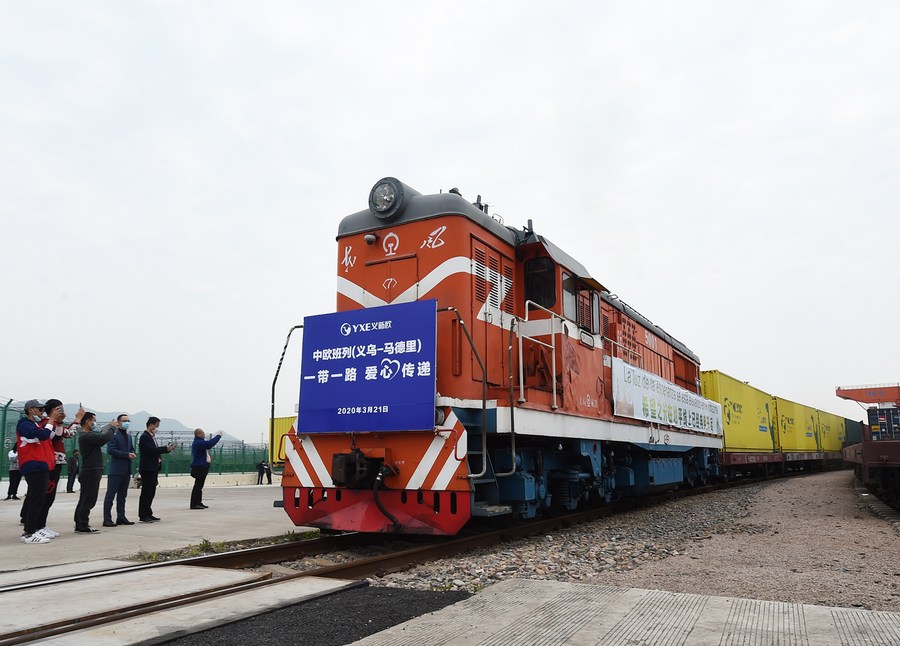
Alicia Garcia-Herrero: Europeans Need to Forge Much More Independent Views about China
Cooperation is a must. It helps everybody in the very same way, because this is a global problem which starts at each single place and is of the same nature.
Editor’s Note: The pandemic of Covid-19 has brought impact on the world economy. What should the world do to cope with this multi-dimensional crisis? What is the role of the China-EU relationship for the world to tackle this crisis? David Gosset, the founder of Europe-China Forum, discussed with Alicia Garcia-Herrero, a leading Spanish economist and a fellow at Bruegel and Real Instituto Elcano in the serial interview of A Time of Resilience.
A Time of Resilience, hosted by Mr. Gosset, is a high-level dialogue with international veteran diplomats, business elites and outstanding scholars. The serial interviews are presented by China Focus in association with DG2CI Limited.
David Gosset: Thank you very much to accept our invitation for a Time of Resilience. This is the way we call these series of conversations. You are a famous economist. What does resilience mean from your perspective?
Alicia Garcia-Herrero: We economists thought for a long time that we didn’t need any resilience, because our profession used to be at the center of the society since Keynes, in my opinion. Markets are first, everybody has to understand market functioning. Thus, no resilience needed. The world changed after the 2008 crisis, because we economists finally, for once, were blamed not to have understood what was happening.
My point is that in my profession the lack of resilience is connected with the lack of challenge which obliges you to be resilient. There is a lot of research by psychologist or neurologist on resilience. And it indicates that resilience is a consequence of weakness. If there’s no weakness, there’s no resilience. Weakness makes you stronger. And that’s why you become resilient.
David Gosset: You spoke about the connection between challenges and resilience and mentioned the 2008 crisis. Well, you would agree that we are in the middle of a serious crisis at the moment. And it seems to me that in order to tackle this very severe multi-dimensional crisis, one should need more international cooperation, but it is not really the case. How do you see the situation? Do you think we have a satisfying degree of international coordination to tackle this crisis as we did tackle the 2008 crisis?
Alicia Garcia-Herrero: This crisis comes on the back of a trade war between the two “superpowers” (China is the largest developing country). So, the point I’m going to make is that COVID-19 is a much bigger crisis than the 2008 crisis. Maybe we might not have a “Lehman event”, but by all accounts, when you look at the number of unemployed people, when you look at the fall in disposable income, this crisis is worse than the 2008 crisis. This is a global shock also. In these conditions, the lack of a coordination is just astounding.
We all know that we have experiences to share. Frankly, I don’t think there is one single country that did everything right. So, obviously we need to learn from each other.
There is an economic concept, again, that I want to share: negative externality. If I’m suffering, others suffer. So, cooperation is a must. It helps everybody in the very same way, because this is a global problem which starts at each single place and is of the same nature.
So, the lack of cooperation is very risky.
David Gosset: Yes. How do you see the role of the EU-China relations? Germany is going to chair the EU presidency from July. We will have a series of very important meetings between the EU leaders and the Chinese leaders. What is the role of the China-EU relationship for the world to tackle this very severe crisis?
Alicia Garcia-Herrero: If there is a bloc, an economic bloc in the world that has learned the hard way the importance of cooperation, well, it is Europe.
I know Europe is not perfect, but I also know that Europeans know how to get to a consensus because they can’t do otherwise.
We don’t have strong leaders, but we have something that nowadays is very valuable, which is, I have three objectives, I give up one for the sake of that other country, I give up the other one for the sake of the other country. I keep my most important objective to fight for.
I don’t want to overstate what Europe can do, but I think there is a European ability to reach agreements at a global level. Think about the WTO. It has created an alternative mechanism for dispute settlement, which China has embarked on. Not the US!

David Gosset: When I listen to what you are saying that we Europeans, Chinese, we can turn this crisis into an opportunity and to make 2020 the year of EU-China cooperation for the interests of the Europeans, the Chinese, but also for the world. And I will remember this idea, but I think that it is very important.
But it seems to me that in the air when you look at the relations between China and the West, there is a lot of mistrust, or at least a lack of trust.
And I wanted to ask you, as an economist, but also as an intellectual and with your experience of the world, what are your advices for us to go at another level of trust?
Alicia Garcia-Herrero: First of all, I think that you’re absolutely right. Not only about the level of trust, but also about its direction.
Frankly, Europeans don’t know China very well. So it’s very difficult to trust because we lack knowledge. I think this is something European governments have to fix. We need to start studying at school, at university, more about Chinese, not only about the Chinese language, but it’s about Chinese history, Chinese culture, even our historical relations in the past. I think it could be a European level strategy.
Direction, why is it getting lower? It’s getting lower for two reasons. First, we can’t forget that we Europeans are still embarked in a transatlantic alliance. So, we are impacted by whatever happens in the US. It is not that we do what the US wants us to do because for us critical thinking defines Europeanness, it is more subtle than that. It’s more about the indirect, the Freudian type of thinking, because we read Anglo-Saxon media and thus, we are induced, but we wouldn’t do it just because we’re asked to do it. You see, this is important to know China also from a Chinese perspective.
Disenchantment might explain also the diminishing trust. Imagine a company in Europe. Rightly or wrongly, somebody told you in 2001 that China joining the WTO would be a truly unique opportunity. But even if some companies have been successful in China, well, for others the experience has been more nuanced, and maybe the expectations were too high. This is why I use the term disenchantment.
More generally, we Europeans need to forge much more independent views about China. I note that the French media are doing a relatively good job in their portrayal of China.
A final remark. China should better explain the paradox of a developing country which at the same time is leading in so many fields. It is hard to understand, so China’s efforts to explain its complex reality have to go on.
David Gosset: Thank you so much Alicia. It is a very rich and nuanced analysis. We could discuss each point. But there is something, your very first point, seems to me extremely important because you see we can be worried by the lack of trust. But what seems to me also absolutely incredible, and we don’t talk enough about that, is the level of ignorance in Europe and in the West, in the US about what is an extremely rich civilization.
For four or five millennia, China has always been a contributor to mankind from so many different perspectives. It seems to me that you have a great point by saying that we need to work in a systematic way at a new level to bridge this knowledge gap.
Of course, we cannot have 500 million Sinologists in Europe! This is not what you’re saying, but at least, one needs to work for an increase of the level of understanding and the realization that actually China is not only a country, but it is a civilization which has always be one fourth, one fifth of mankind in terms of population, and which is, by the way, coming back to a position of centrality, which has been its position, let’s say, up to the industrial revolution.
 Facebook
Facebook
 Twitter
Twitter
 Linkedin
Linkedin
 Google +
Google +










